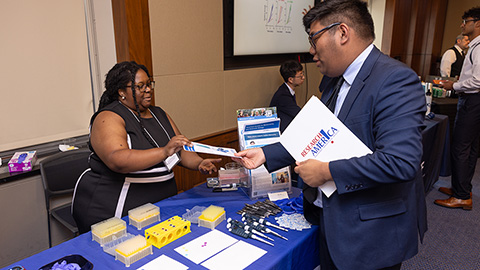ASBMB weighs in on NIH prize for effective diversity efforts
The American Society for Biochemistry and Molecular Biology submitted comments last week to the National Institutes of Health about the agency’s plan to develop a competition for excellence in diversity, equity, inclusion and accessibility.
The ASBMB Public Affairs Advisory Committee, based on its members’ experiences leading DEIA programs, encouraged the NIH to reward institutions and program leaders who have run long-term and sustainable DEIA efforts resulting in structural change.
Shantá Hinton, a professor at William and Mary and a member of the PAAC, emphasized that individuals — not just institutions — need to be recognized for their work.
“Individuals make tremendous sacrifices — professionally, personally and emotionally. Thus, it is important to visibly appreciate them for their efforts,” Hinton said. “Rewarding them for their long-term efforts … hopefully alleviates them from being treated as second-class citizens in the scientific community. In addition, it allows them to have resources, which are traditionally very limited, to expand the success of their programs.”
NIH Chief Officer for Scientific Workforce Development Marie Bernard announced on May 3 that the agency was seeking input on its plan to establish a prize to reward colleges and universities that have excelled at implementing DEIA interventions that increase diversity of faculty and students. The prize was born from a collaboration of Bernard’s office and the UNITE committee, which is charged with identifying and addressing structural racism at the NIH and in the greater scientific community.
The NIH requested input on six topics.
l. Structure of the competition
The society suggested holding the competition every three years, with a portion of each prize going to the institution and a portion going to the program leader. Additionally, the society recommended judging research-intensive institutions and low- or limited-resourced institutions separately.
Low- or limited-resourced institutions, including many minority-serving institutions, are known for their DEIA work. For instance, Xavier University of Louisiana, which produces more Black medical school graduates each year than any other university in the United States, was recognized by the NIH Office of Research on Women’s Health last year for its commitment to faculty gender diversity.
2. Outreach
The ASBMB suggested using various platforms for outreach and emphasized the importance of partnering with scientific and DEAI-focused organizations and coordinating with the offices of sponsored research at low- or limited-resourced institutions.
3. Judging criteria
The ASBMB suggested that the NIH model its criteria after those for the NIH Prize for Enhancing Faculty Gender Diversity in Biomedical and Behavioral Science, which included standards of impact, metrics, sustainability, application ability and lessons learned.
4. Timing
To provide low- or limited-resourced institutions plenty of time to submit, the ASBMB proposed: “The application should be open for eight months, and the winners should be announced four months from the submission deadline.”
5. Dissemination of winning submissions
The society recommended using various platforms to announce the winners and share toolkits of resources by the winners. Furthermore, the ASBMB recommended holding a forum to share innovations, initiatives and programs that were enhanced or developed as a result of the prize.
6. Reasons for and potential barriers in applying
Lastly, the society urged the NIH to recognize that those who head DEIA efforts are often overburdened with teaching and administrative duties and recommended that the agency do all that it can to make participation in the contest simple.
Many of the ASBMB’s recommendations referenced the NIH’s Prize for Enhancing Faculty Gender Diversity in Biomedical and Behavioral Science, which awarded 10 prizes last year. The award was spearheaded by the Office of Research on Women’s Health and aimed to reward institutions that excelled in evidence-based efforts to tackle challenges and improve careers for women in the biomedical and behavioral sciences.
Read the society’s full comments here.
Enjoy reading ASBMB Today?
Become a member to receive the print edition four times a year and the digital edition monthly.
Learn moreGet the latest from ASBMB Today
Enter your email address, and we’ll send you a weekly email with recent articles, interviews and more.
Latest in Policy
Policy highlights or most popular articles

Embrace your neurodivergence and flourish in college
This guide offers practical advice on setting yourself up for success — learn how to leverage campus resources, work with professors and embrace your strengths.

ASBMB honors Lawrence Tabak with public service award
He will deliver prerecorded remarks at the 2025 ASBMB Annual Meeting in Chicago.

Summer internships in an unpredictable funding environment
With the National Institutes of Health and other institutions canceling summer programs, many students are left scrambling for alternatives. If your program has been canceled or delayed, consider applying for other opportunities or taking a course.

Black excellence in biotech: Shaping the future of an industry
This Black History Month, we highlight the impact of DEI initiatives, trailblazing scientists and industry leaders working to create a more inclusive and scientific community. Discover how you can be part of the movement.

ASBMB releases statement on sustaining U.S. scientific leadership
The society encourages the executive and legislative branches of the U.S. government to continue their support of the nation’s leadership in science.

ASBMB and advocacy: What we accomplished in 2024
PAAC members met with policymakers to advocate for basic scientific research, connected some fellow members with funding opportunities and trained others to advocate for science.

